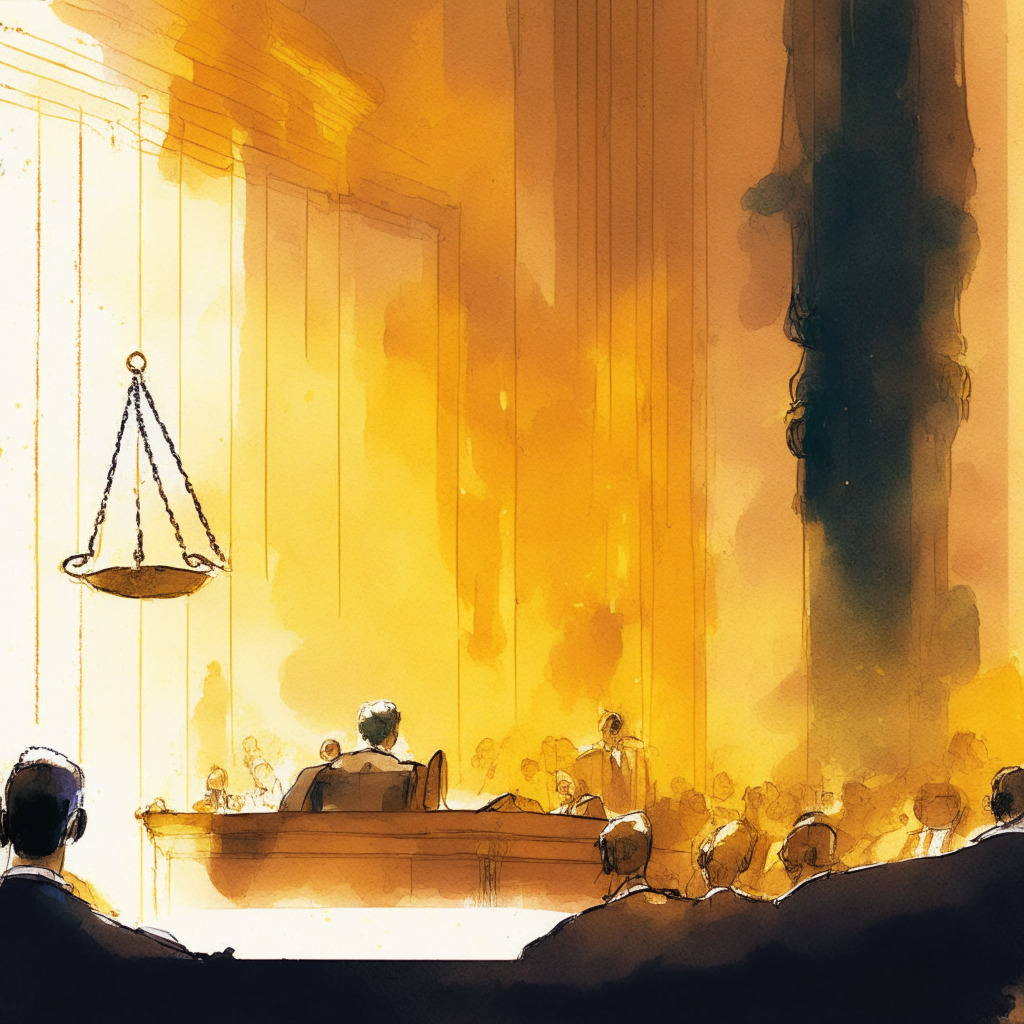The U.S. SEC’s dissatisfaction with the state of spot bitcoin ETF applications is due to their lack of clear surveillance-sharing agreements (SSAs) designed to detect market fraud. Coinbase, while a credible candidate, presents challenges as a surveillance overseer, sparking discussions about an invasive, regulation-heavy future for bitcoin.
Search Results for: blur
NFT Floor Price Plunge: Impact of Blur Marketplace and Future of Blue Chip Collections
The floor prices of top Ethereum NFT collections such as Bored Ape Yacht Club and CryptoPunks have plunged over the last 24 hours, with Bored Ape seeing its lowest floor price since November 2021. Some traders attribute this to the influence of NFT marketplace Blur, as trading volumes decrease and users farm tokens on the Blend lending platform, resulting in suppressed prices.
196M BLUR Token Unlock: Market Impact, Whale Moves, and SmartMoney Strategies Explained
The crypto community is abuzz as 196 million tokens, worth $62.3M and equivalent to approximately 40% of BLUR’s circulating supply, will be unlocked. The event has sparked discussions regarding potential impacts on market sentiment and the buying or selling behavior of SmartMoney and whales.
Exploring the Impact of Blend, Blur’s NFT Lending Platform: Opportunities and Controversies
NFT marketplace Blur introduced Blend, a lending platform that has reached over 100,000 ETH ($181 million) in total volume in just 17 days. Blend allows users to take out Ethereum loans using NFTs as collateral, contributing to the emerging “NFTfi” niche and further boosting Blur’s prominence.
Blurring the Lines: Checks Elements Combines NFTs and Hand-Drawn Art – A Harmonious Future?
Jack Butcher launches Checks Elements, combining generative art with hand-drawn physical prints in a 152-piece collection inspired by earth, fire, water, and air. Bridging digital and physical art, the collection connects Ethereum-based NFTs with Butcher’s authenticated monoprints.
NFT Trading Volume Surge in Q1 2023: Analyzing the Impact of Blur’s Token Airdrop
NFT trading volumes on Ethereum surged in Q1 2023, partially due to the airdrop farming frenzy for Blur’s native token, BLUR. Volumes doubled from $1.9 billion in Q4 2022 to $4.5 billion in Q1 2023. However, recent months show a bearish outlook with declining trading volumes and sales.
Blurring Lines: How Family Dynamics Drive Success in the NFT Space
The rise of NFTs highlights close-knit family relationships as driving forces behind popular projects like Women and Weapons and Chimpers. Founders navigate unique challenges but demonstrate the power of trust, commitment, and complementary skillsets in achieving digital success in a rapidly changing landscape.
NFT Marketplace Blur Introduces Blend: A Risky Game of Perpetual Loans or Liquidity Boost for Token Owners?
Blur, the influential NFT Marketplace for pro traders, has unveiled Blend, an innovative peer-to-peer perpetual […]
Dubai’s VARA Clamps Down on Bored Gen DMCC: The Fine Line Between Crypto Innovation and Regulation Compliance
Dubai Virtual Assets Regulatory Authority (VARA) puts Bored Gen DMCC under scrutiny for its dealings related to Islamic Coin, triggering an investigation for an alleged violation of regional regulations. Despite notable accolades, VARA asserts the crypto venture lacks the required permissions, addressing a potential lapse in regulation compliance.
Blending Art and Blockchain: Dubai’s 37xDubai Explores NFTs and Web3 Future
“Dubai-based art gallery, 37xDubai, aims to educate artists and enthusiasts about Nonfungible Tokens (NFTs) and the Web3 ecosystem. The gallery is blending art and technology, viewing NFTs as a method to foster inclusivity within the art community. However, the unpredictable market conditions add complexity to this innovation.”
Ethereum’s Arbitrum Dips: A Bearish Turn or a Bullish Opportunity for Meme Kombat?
The future of Ethereum’s Arbitrum sees market dip, raising questions about its potential to hit rock-bottom. Despite this, Arbitrum’s trading price is considered solid for short-term investors, indicated by a potential market rebound. Meanwhile, investors are diverting attention – and resources – to an emerging meme coin presale – Meme Kombat, a decentralized Web3 platform offering unique tokenomics.
Telegram’s Blockchain-based Super-App: An Encroaching Security or Blessing in Disguise?
“Telegram’s Open Network (TON) has received major investment from MEXC exchange, aiming to enhance TON’s role in shaping Telegram’s journey towards becoming a Web3 super-app. However, concerns over security measures are being raised given the potential risks posed by blockchain platforms and crypto transactions.”
Unraveling the SBF Saga: Altruist or Lawbreaker in the Crypto World’s Courtroom?
“The primary issue at SBF’s trial is whether FTX, not regulated in the United States, is held to the same jurisdiction as FTX.US. The outcome might define the future of regulation in uncharted waters of the crypto world.”
Crypto King’s Failed $5 Billion Bid to Block Trump’s Political Return: A Suspect Love Affair with Power
“In a shocking revelation, FTX founder considered offering $5 billion to dissuade former U.S. President Donald Trump from re-running. This idea fell apart due to FTX’s financial crisis. Now, significant fraud charges against FTX’s founder await trial, causing huge uncertainty in the crypto industry.”
Regulatory Tug-of-War: SEC Scrutiny on Prager Metis Over FTX Audits – Decoding the Implications
“The United States SEC is taking legal action against Prager Metis, an auditing firm previously employed by FTX, allegedly violating auditor independence rules. This scandal begs vital questions about corporate governance and ethical practices in the crypto industry, and whether current regulation methods could inhibit the sector’s innovation and growth.”
SEC’s Bitcoin ETF Decision Delay: A Strategic Extender or Investor Protector?
The U.S. Securities and Exchange Commission (SEC) has postponed ruling on applications for spot Bitcoin exchange-traded funds (ETFs), including from big players like BlackRock and Invesco. This delay coincides with the possible U.S. government shutdown and its impact on SEC’s operations. Despite pointed SEC caution due to investor protection concerns, industry optimism for a Bitcoin ETF approval is rising.
Court Overrules SEC’s Dismissal on Bitcoin ETF: A New Dawn for Grayscale or a Risky Bet?
A US federal judge recently overturned the SEC’s dismissal of Grayscale’s proposal to convert its Bitcoin Trust (GBTC) into an ETF, causing ripple effects in the crypto market. Analysts project a 75% likelihood of spot Bitcoin ETF acceptance in 2023. This may lead to substantial consequences for the crypto market, potentially boosting Bitcoin price and possibly paving way for Ethereum’s approval.
Coinbase’s Expansion Emphasizes Need for International Crypto Regulations
Coinbase, a leading US-based crypto exchange, has secured approval from the Bermuda Monetary Authority to offer perpetual futures trading services outside the US. This move aims to tap into the growing retail sector interest in cryptocurrency trading, which constitutes three-quarters of the global crypto trading volumes. With a global expansion strategy covering 24 countries, Coinbase also plans to advocate for standardized cryptocurrency regulations at the G20 forum in Brazil.
Gary Gensler’s Regulatory Tightrope: Balancing Innovation and Regulation in Cryptocurrency
The SEC under Gary Gensler’s leadership has been accused of regulatory overreach, hampering the U.S. capital markets. While many criticize the lack of clear regulations around cryptocurrencies and other novel financial instruments, Gensler refrains from concrete classification, highlighting the complexity of these emerging issues.
Meta AI vs OpenAI’s ChatGPT: The Dawn of a New Social Media Interaction Era and Its Ramifications
“Mark Zuckerberg sets to launch Meta AI, interacting across platforms like Instagram and Facebook. Aiming to outdo OpenAI’s ChatGPT, Meta tailors AI products to distinct use cases and entertainment, scheduled to release to selected U.S users and integrate with upcoming smart glasses.”
The Bittersweet Symphony of Blockchain and Gaming: Capabilities, Challenges, and Future Implications
“Minecraft’s Bitcoin-friendly server, Satlantis, had to remove its play-to-earn features due to pressure from game developer Mojang, disappointing the gaming community. Despite this, Satlantis remains operational and seeks alternative platforms for innovation. Concurrently, Apple’s new gaming-friendly iPhone models face NFT app regulation hurdles.”
AI vs Human Authored Content: Google’s Policy Shift Raises Questions on Web Knowledge Reliability
“In a significant policy shift, Google now accepts content generated by artificial intelligence (AI). This change brings several issues to light: defining quality content, distinguishing between human and AI-written work, and the reliability of AI-produced content. This shift may escalate unchecked and unsourced information on the internet.”
Regulation in Crypto: Spotlight on FTX Founder’s Trial and its Impact on Future Frameworks
“The case against Sam Bankman-Fried, founder of crypto exchange FTX, exemplifies the increasing relevance of regulation in the crypto world. Legal proceedings reveal his political donations to be admissible, offering insight into alleged misuse of FTX customer funds. Additionally, Bankman-Fried’s involvement in creating and allegedly manipulating FTX Token prices illuminates broader concerns of fraudulent token price manipulation within the crypto industry.”
Decentralization of AI: Inhibition by Regulation vs Growth through Open-Sourcing
“Brian Armstrong, CEO of Coinbase, is advocating for a ‘laissez-faire’ approach to artificial intelligence (AI) development, opposing AI regulation as it stifles innovation. He suggests decentralization and open sourcing as alternatives. Despite potential risks, Armstrong believes in fostering growth and rapid development in the AI field.”
Unraveling the FTX Debacle: A Glimpse into Possible Fraud and the Future of Crypto Regulation
“The FTX lawsuit involving allegations of fraudulent activities and potential internal orchestration that undermines regulations emphasizes the need for robust regulatory infrastructures in the crypto industry. The incident spotlights the risks and unpredictability inherent in digital currency investments, especially during company bankruptcies.”
Battle Royale for Wallets: Web3 Gaming vs Traditional Gaming – A New Frontier in the Metaverse
The objective of Krafton’s Web3 journey with blockchain project Settlus is to offer content creators a transparent payment platform. A potential metaverse project, Migaloo, allows creators to monetize their digital content through non-fungible tokens (NFTs). However, developers must strike a balance between engaging gameplay in the Web3 space and monetization to build a larger user base.
Unfolding Grab’s Web3 Wallet Experiment: Boon or Bane for Southeast Asia’s Crypto Future?
“Southeast Asian tech giant, Grab collaborates with stablecoin operator Circle to test a Web3 wallet in their superapp, offering non-fungible token (NFT) vouchers to users. They aim to mainstream blockchain tech and integrate stablecoins into daily transactions. However, issues around data privacy and security underscore the need for clear regulation in this largely uncharted territory.”
Regulation Roulette: The Balancing Act between Blockchain Privacy and Security
“The OneCoin fraud case highlights significant challenges for cryptocurrency regulations. As the line between privacy and security blurs, there’s a growing need for nuanced regulatory strategies and discernment in this evolving techno-finance landscape to prevent potential violations of user privacy.”
Exploring the Probability of Marking Digital Ruble Tokens: A Double-Edged Sword for Russian CBDC
The Russian Central Bank potentially explores “marking” digital ruble tokens to track CBDC transactions, allowing close monitoring of funds usage. This suggests super-traceable tokens could be a reality soon, although there are cautionary notes around the required balance between regulation and autonomy in digital currency.
Meta’s AI Showdown: A Winsome Leap Forward or a Costly Misstep?
“Meta plans to develop an advanced AI model, potentially surpassing OpenAI systems. However, concerns arise around data center construction, chip supply, and ethical issues. Interestingly, AI and crypto’s convergence could pave the path to a tech-advanced future, but with challenges.”
East Asia’s Blockchain Paradox: Remarkable Tech Advancements Amid Regulatory Challenges & Scams
“Tencent’s new large language model, Hunyuan, features over 2 trillion training parameters, promising more efficient data processing. However, questions about data-handling accuracy persist. Meanwhile, South Korea witnesses an $83 million crypto scam, underscoring the need for greater transparency and accountability in the cryptosphere.”
The Fine Line Between Crypto User Authentication and Privacy Intrusion
“The crypto industry is prioritizing proof-of-humanity solutions to distinguish genuine users from bots. While techniques such as Zero Knowledge Proofs and blockchain-based Proof of Burn ensure credible, anonymous verification, they also need to incorporate ‘privacy-by-design’ principles. The focus is on user control, data privacy, and safeguarding against fake accounts and automated bots without infringing user’s privacy.”































